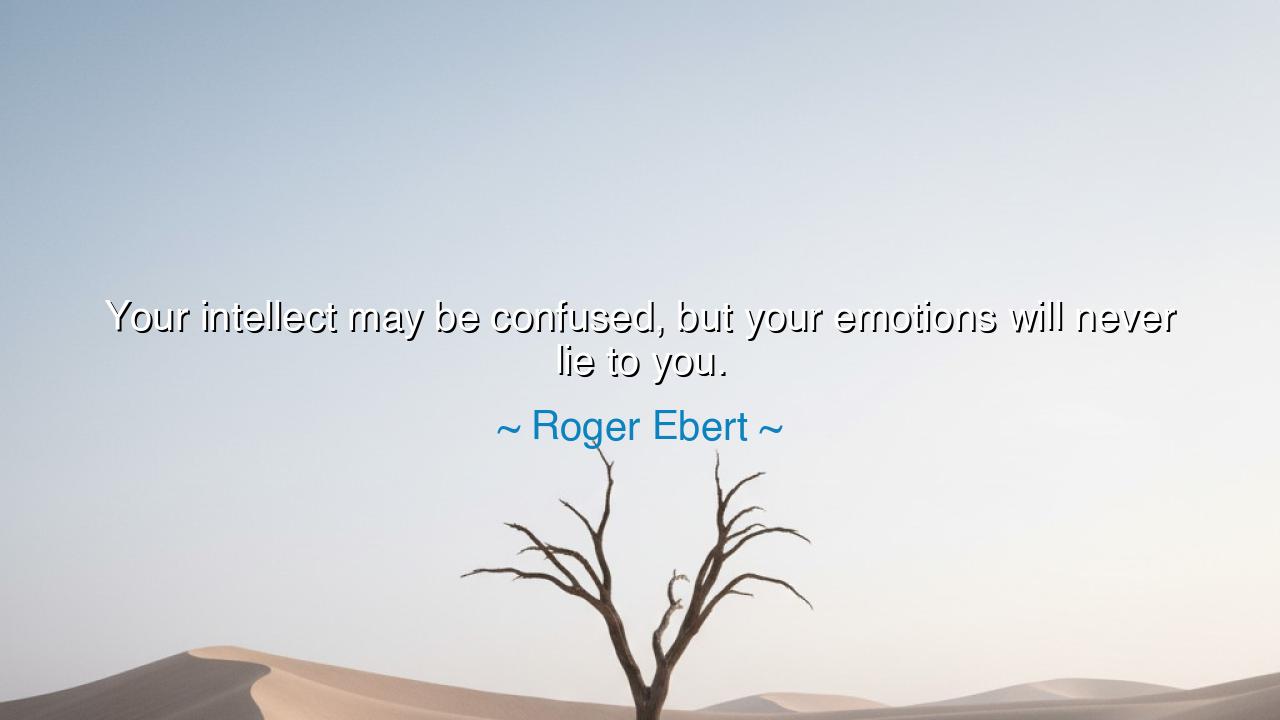
Your intellect may be confused, but your emotions will never lie






“Your intellect may be confused, but your emotions will never lie to you.” Thus spoke Roger Ebert, the great critic of cinema, whose insight into art was also an insight into the human soul. In these words, he unveiled a truth as old as thought itself: that reason may falter, but feeling speaks from the deeper self. The mind may twist in circles of doubt, lost in arguments and logic, yet the heart—if one dares to listen—remains faithful to truth. This is not to say that emotion is infallible in action, but that it reveals what is authentic within us, what cannot be faked, silenced, or reasoned away.
Ebert, who spent his life interpreting the emotions of story and image, understood that human beings are not creatures of intellect alone. Beneath the structure of thought lies the current of emotion, flowing from the soul’s hidden depths. Our intellect, shaped by education, culture, and fear, can be clouded or deceived. We can convince ourselves of falsehoods, justify wrong choices, or rationalize betrayal. But the heart—though often wordless—rings true. When we feel sorrow, awe, joy, or unease, it is the soul whispering, “This is real.” Thus, when Ebert said that emotions never lie, he was reminding us that truth is not always found in argument, but in experience.
The ancients knew this well. The philosopher Plato wrote that reason and passion must be yoked together, like two horses drawing the chariot of the soul. When reason alone leads, it forgets compassion and meaning; when passion alone leads, it loses direction. Yet even Plato admitted that emotion—properly understood—reveals what reason often denies: the living essence of being. The Stoics, too, who sought calm in the midst of chaos, never said to kill emotion, but to understand it. For emotion is not our enemy; it is our compass. It tells us when we are aligned with truth and when we have strayed.
In Ebert’s own life, this truth shone brightly. As illness took his voice, and he lost the power of speech, his emotions became the truer language of his existence. His intellect could no longer express itself in sound, but his heart still spoke through the warmth of his eyes, the movement of his hands, and the words he continued to write. In that silence, he discovered what he had always known through cinema—that emotions are the purest medium of human truth. Movies moved him not because they were logical, but because they were felt. They reached past intellect into the hidden chamber of empathy and wonder, where all humanity is one.
Consider also the life of Anne Frank, whose diary remains one of the world’s great testaments to feeling. Trapped in hiding, surrounded by fear, she still wrote of hope, love, and beauty. Her intellect knew the danger, yet her heart refused despair. Her emotions—her faith in goodness—became her reality, stronger than the darkness that sought to consume her. Though her mind could be confused by suffering, her emotions told her a deeper truth: that life, even in its pain, was worth believing in.
Yet we must also understand the wisdom hidden in Ebert’s paradox. Emotions never lie, but they can be misread. They reveal truth, but not always the truth of the world—they reveal the truth of you. Fear does not mean danger is real, but that something within you feels unsafe. Anger does not mean others are wrong, but that something sacred in you has been touched. To be wise, therefore, is not to suppress emotion, but to listen to it, to learn its language. When the intellect and emotion stand opposed, the path forward is not to choose one over the other, but to let each illuminate the other.
So, my child of thought and heart, remember this teaching: the mind knows the map, but the heart knows the way. When your intellect wavers—when choices blur and reasons clash—turn inward. Ask not only what you think, but what you feel. In your quietest feelings dwell the traces of truth that logic cannot reach. Trust them, but temper them with wisdom. Let the intellect guide the hands, but let the heart guide the soul.
For in the end, it is not cold reason that gives life meaning—it is the emotion that burns within it. The intellect may seek to define truth, but it is feeling that recognizes it. To live fully, one must listen to both—but when the mind is confused and the road uncertain, follow the voice that does not lie: the voice that beats within your own chest. For that is the voice of truth, and it has been speaking to humanity since before the dawn of thought.






AAdministratorAdministrator
Welcome, honored guests. Please leave a comment, we will respond soon